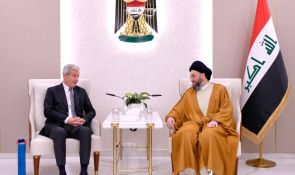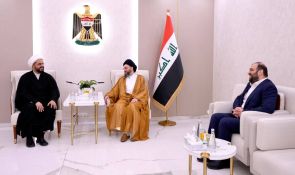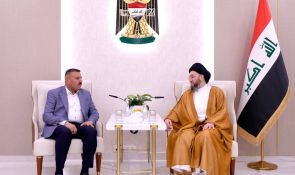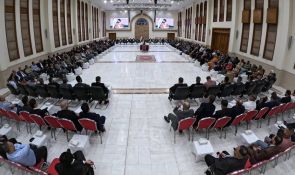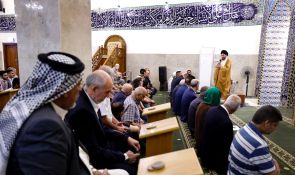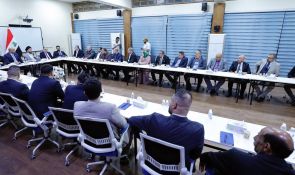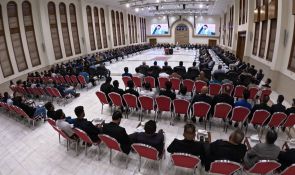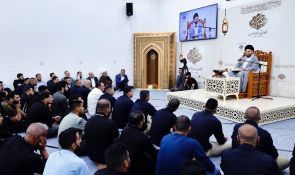Sayyid Ammar al-Hakim: national settlement bill is a project to build a state on the basis of citizenship, the Popular Mobilization Forces Act is important for its humanitarian and legal aspects
Head of the National Iraqi Alliance, Sayyid Ammar al-Hakim, considered the Popular Mobilization Forces Act an important law in its humanitarian aspects that would keep the rights of combatants and protect them from being penetrated, his eminence indicated that the national settlement bill is a reassuring project that would gather all Iraqis away from retaliation and defamation actions, and it is necessary to stop the bloodshed and will support the restore the security of Iraq, heeding to, \"if we do not embrace a national settlement to save Iraq now, we will turn to it after a while, \"stressing\" despite everything that was raised by those affected by the national settlement bill, that only know to live under the convulsive atmosphere and discourse, but the settlement do not and will not include the murderers and who have blood of Iraqis on their hands. \"
\r\nHis eminence at Baghdad Dewan of tribes and clans leaders in Iraq, at his office Saturday, 03/12/2016, urged figures, political, national, social and tribal actors to educate people from their own area of influence to the importance of restoring harmony to the Iraqi society, pointing out that the previous reconciliation projects costed billions of dollars, yet was not effective, noting that the National Iraqi Alliance, supported by its affiliates wanted the national settlement to be a real full belief in the political process, recognizing the election as a result of a genuine expression of people political opinion. The second demand is to achieve security through eliminating bastions of terrorism and to not listen to outside intrusions that feed terrorism, as well as requiring a regional cover for the national settlement and region countries\' acceptance to the current actuality of Iraq as a diverse and pivotal country.
\r\nHis eminence indicated that the United Nations has adopted a promotion of the project internally and externally, stressing that the timing to the launch of the project will be after the liberation of Mosul, and that the project\'s clauses would remove all the bruit raised around it and there is no negotiating with Daesh or the Baath Party, pointing out that the project resulted after nine months of work and effort to complete the project and present it to the National Iraqi Alliance for approval by the General and the Political and the Leadership authorities.
\r\nIn respect of the Popular Mobilization Forces Act, his eminence expressed regret that the law has not been adopted by all political blocs, yet the popular mobilization forces did not go for a recreation journey, on the contrary they had sacrificed their blood to liberate the lands of the affiliates who are associated to same political blocs that did not adopt the Popular Mobilization Forces Act, noting that the popular Mobilization Forces Act has a humanist aspect by keeping the rights of fighters, the martyrs and the wounded, as well as to protect the popular mobilization forces legally and bear arms exclusively through the state, and protecting the popular mobilization forces from penetrations , wondering, \"Is it logical to abandon an elite force that have lots of experience in the light of the Iraqi army status that undergoes setbacks and in a re-arrangement phase.
\r\n.His eminence indicated that the National Iraqi Alliance had explaining the importance of the law to all political forces, adding that the votes were 228, including 78 from outside the National Iraqi Alliance, noting that the communication are still continuing with everyone and there is no one is forced or influenced, pointing to the importance of the tribal law to protect this institution, especially since its customs mostly agree with patriotic and Islamic standards.


